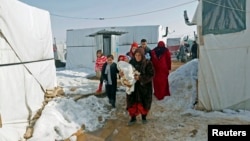Recent moves by the Lebanese government to control the influx of Syrian refugees have had a “dramatic impact” on the ability of those fleeing the war to enter the country, a senior UNHCR official has claimed.
Most recently, the government introduced a new visa requirement for Syrians entering Lebanon, despite concerns raised by the international community about the welfare of those seeking to escape the fighting.
In addition, a number of new policies have been introduced since last summer to make access across Lebanon's border with Syria more difficult, as the country struggles under the burden of more than 1 million refugees.
Fewer refugees
At a news briefing Tuesday, UNHCR representative for Lebanon Ninette Kelley revealed the number of registered refugees entering the country had declined from an average of 59,000 a month in 2013 down to 37,000 a month in 2014, dropping to an average of 14,000 in the last three months of the year.
“From what we’ve seen [the restrictions] have had quite a dramatic impact on the ability of refugees to enter the country,” she said. “It was the intent of the government, which has said for a long time that as a small country it simply cannot continue to take in that it has in the past.”
The new visa requirement was first announced earlier this month and means Syrians must give a reason for entering Lebanon, though none of the six types of entry permit are explicitly for refugees.
On Friday Lebanon’s social affairs minister Rashid Derbas said that though they might undergo minor adjustments there would be “ no going back on the border measures” and claimed that since the measures took effect on January 5 not a single Syrian refugee had entered the country.
At the briefing Kelley stated “there’s only so much a country can shoulder” and said it is too early to measure the impact of the latest move, but pointed to anecdotal evidence that some form of restriction had kicked in on the country's borders.
Ongoing dialogue
The UNHCR, the U.N. agency that deals with refugees, was holding an ongoing dialogue with the government over the issue, as well as establishing the extent to which humanitarian exceptions would be made, she added.
“We are hearing of many cases of people approaching the border seeking to come into Lebanon to seek protection that have not been allowed through, and we are also hearing of cases where exceptions have been made” Kelley stated.
But the UNHCR had not yet seen “procedures for implementing those humanitarian exceptions”, she said, telling journalists the government was likely to admit “only the most extreme cases” of humanitarian need.
Funding needed
Working alongside the United Nations and other agencies as part of a joint international appeal last year, the Lebanese government was able to raise only about $700 million of $1.7 billion funding sought to help deal with the crisis.
Kelley said the “net was being cast more widely” for the coming years, with the latest response plan requiring $2.14 billion in funding, while the target of refugees being resettled is increasing from a target of 8,700 in 2014 to 10,000 over 2015.
Kelley confirmed that the Lebanese government had no plans for permanent settlements and called for more “robust” action around the issue of refugee camps, which are not being built in an official capacity amid concerns over permanent and long-term settlement of the refugees in Lebanon.
“Often if we can avoid refugee camps it is advisable, but we argue in Lebanon that there needs to be something urgently done to take us forward in terms of accommodation,” she added.




